Okay, okay. Maybe the title is a little clickbaity, because changing your habits requires effort. However, having some structure and changing your environment during the holiday season can reduce the effort involved in making healthier decisions. Making healthier decisions will help firefighters maximize their energy levels and minimize overeating over the holidays. Try these tips for eating better now and in the new year.
1 ) Hide the sweets and treats.
Want a hack for eating more produce and less sweets on shift? Hide the treats behind a closed door! Dr. Jill Joyce, a dietitian at OSU, received grant funding to provide fire stations with tangerines, apples, granola bars, trail mix, veggies/dip, and other healthy snacks. There was one rule for receiving the snacks: Firefighters had to hide all treats behind a closed door, and only Dr. Joyce’s snacks could be on the counters. She found that firefighters ate an extra pound of produce per shift when healthier options were visually available and the treats were out of sight. It can be intimidating to bring healthier options as your overtime contribution, but it can make a big difference in the quality of food firefighters choose on shift.
2) You get only one sweet per shift.
Yes, the dietitian is recommending a reasonable treat per shift. Why? Well, what happens when you tell a firefighter never to have something again? They want it significantly more, and then overeat it once they can finally have it again. Plus, food is part of the magic of the holidays! You only get so many holidays with this crew and your family.
One sweet per shift doesn’t make the treat off-limits, but you must be strategic. Do you want a treat first thing at lineup, or is it better to save it when your willpower tanks after midnight? A treat is one reasonable serving of candy, baked goods, ice cream, sweet tea, soda, etc. Of course, this might increase during parties, but try to stick to this on routine days.
3) Aim for a protein and plant at each meal.
If hunger is a challenge, aim for a protein and a plant (a.k.a. fruit or veggie) at each meal. The protein will help with muscle gain or maintenance, and the plant will provide health-promoting and hunger-crushing fiber. Of course, this does not mean you have to avoid carbs and fat, but most of us gravitate towards carbs as the first thing on our plates.
The protein-and-a-plant rule fills in the main gaps in firefighter nutrition, because these are often the first foods to go when fatigue sets in. Double up on veggies at dinner or salsas in burrito bowls if needed. Add spinach to smoothies or get a fruit cup at fast food restaurants. If numbers help, aim for 0.7-1.0 grams of protein per pound you weigh and 25-38 g of fiber per day. Try an app like Chronometer or Calorie Counter by Fat Secret to help with accountability.
4) Bring better snacks.
Many firefighters will cut out snacks entirely when they feel like they are snacking too much. While this can help create a calorie deficit, cutting out snacking entirely can create too much of a calorie deficit, leading to low energy during the day and overeating at dinner time. Additionally, many firefighters need more calories when they are on shift than off shift due to extra walking, workouts, or active training and calls. The trick is replacing lower-quality snacks—chips, donuts, candy—with higher-quality snacks. Try packing the following in a go bag to edge out some of the less healthy options:
- Low-sodium beef jerky
- Chicken packets
- Tuna packets
- Dried chickpeas
- Good Bean snack mixes
- Kodiak Power Cups
- Popcorners Protein Crisps
- Dried fruit (That’s It Bars)
- Fig Bars
- Clif Bars
- Applesauce pouches
- White cheddar popcorn
- Dried edamame
- Pistachios
- Pumpkin seeds
- Protein shakes
- Protein bars
5) Eat a snack before the holiday meal
Many firefighters skip meals before a holiday feast, which can lead to low energy during the day and ravenous hunger by dinner time. To prevent this, eat regular meals before the party. Emphasize the protein and plant portions to keep you full and fill the gaps most party foods miss.
Consider bringing or standing in front of the veggie or fruit platters. Eating a side salad, soup, veggies and dip, or a piece of fruit before meals can naturally reduce your portion of the main course. Try this trick any time of year on shift! Have an apple before dinner or eat the salad before digging into the rest of the plate.
Megan Lautz is a registered dietitian and coach who specializes in firefighter nutrition. Her mission is to help firefighters perform better; recover faster; and enjoy long, healthy retirements. Lautz owns RescueRD LLC, which provides nutrition seminars and coaching for tactical athletes nationwide. Check out @Rescue.RD on Facebook and Instagram.


